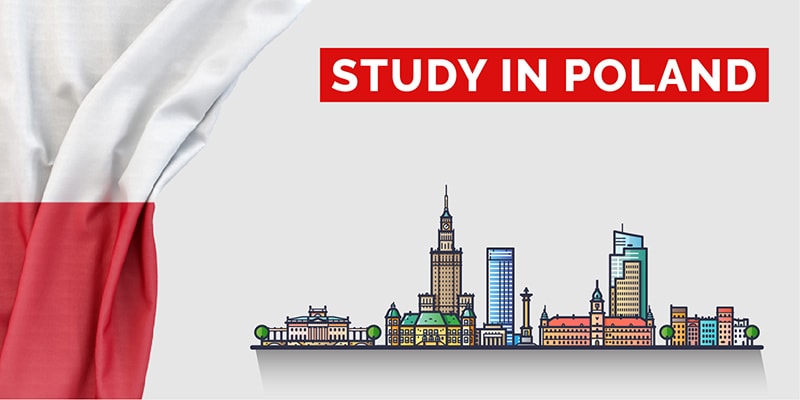Career Tips
Study In Poland: Admission Requirements, Universities, Fees & More

International students seeking higher education are flocking to Poland. Poland is a great country to study due to its low tuition, high-quality education, and rich culture. International students seeking higher education in Poland should read this article about the education system, admission standards, and scholarships.
Overview of the Higher Education System in Poland
Polish higher education includes universities, technical universities, and vocational higher education colleges. Poland has around 400 governmental, private, and specialized universities. Many Polish universities are in the top 1000 worldwide for their education and research.
Academic Year in Poland
The Polish academic year begins in October and has two semesters: winter and summer. The summer semester runs from February to June, whereas the winter semester runs from October to February. The average semester is 15 weeks, with a September test.
Admission Requirements
International student admission standards vary by institution and program. Most Polish universities have certain common requirements. International students must first have a high school diploma. They must also demonstrate competency in Polish or English, the language of instruction. This can be done with TOEFL or IELTS tests.
Some colleges demand CVs, motivation letters, and recommendation letters. International students must examine entrance requirements for their selected school and program.
Tuition Fees and Scholarships
Low tuition is a major benefit of studying in Poland. Polish tuition is low compared to other European countries. International students’ tuition expenses vary by school and program. On average, undergraduate tuition costs €2,000 to €5,000 per year, while graduate tuition costs €2,500 to €6,000.There are also scholarships for international students studying in Poland. Polish NAWA and Erasmus+ give the most popular scholarships. Based on academic merit and financial need, these scholarships cover tuition, housing, and living expenses.
Student Life and Accommodation
Poland boasts 1.5 million students, a vibrant student community. International students in Poland can expect a warm welcome and diverse culture. History, art, music, and food are famous in the country. International students in Poland might live in university dorms, individual residences, or communal flats. University dorms are the most popular since they are economical and handy. International students can live in individual or communal apartments, although they are more expensive.
Part-time Work and Post-Graduation Opportunities
Part-time work is allowed for international students in Poland. Their local government must provide them a work permit. International students can work 20 hours per week during the school year and full-time during summer vacations. International students in Poland can meet living costs with part-time jobs.
International students can apply for a temporary residence visa to work in Poland after graduating. Extensions are available for the 1.5-year permit. International students in Poland have many post-graduation options. Polish degrees allow graduates to work in Poland or return home. Polish degrees are respected worldwide by employers. Graduates can pursue education in Poland or abroad.
Top Universities in Poland
There are several top universities in Poland that offer high-quality education and research opportunities for international students. Here are some of the top universities in Poland:
- Jagiellonian University: Founded in 1364, Jagiellonian University is one of the oldest universities in Europe. It is located in Kraków, a beautiful city known for its history and culture. The university offers a wide range of programs in fields such as humanities, social sciences, natural sciences, and medicine.
- Warsaw University: Warsaw University is one of the largest universities in Poland, with over 40,000 students. It is located in the capital city of Warsaw and offers programs in fields such as law, economics, social sciences, and natural sciences.
- AGH University of Science and Technology: AGH University of Science and Technology is a technical university located in Kraków. It is known for its excellent programs in engineering, computer science, and natural sciences.
- University of Warsaw: The University of Warsaw is one of the oldest universities in Poland, founded in 1816. It is located in the capital city of Warsaw and offers programs in fields such as humanities, social sciences, and natural sciences.
- Wrocław University of Science and Technology: Wrocław University of Science and Technology is a technical university located in the city of Wrocław. It is known for its excellent programs in engineering, computer science, and natural sciences.
In conclusion, Poland is a great place for international students to study. High-quality education, low tuition, and diversified culture are available in the country. International students can pick from over 400 universities, including major research universities. The admission standards for international students vary by institution and program, and there are scholarships to help cover tuition and living expenses. International students can work part-time and seek for a temporary residency permit after graduating. Overall, studying in Poland is a terrific investment in career and personal growth.
FAQs
1. What is the higher education system in Poland like?
Polish higher education includes universities, technical universities, medical schools, art schools, and others. The academic year has two semesters, October and February. Some universities require supplementary entry tests, but the secondary school leaving exam is usually used for admission. Polish universities offer undergraduate and postgraduate studies.
2. What are the admission requirements for higher education in Poland?
Polish higher education entry standards differ by course and institution. Applicants must have completed secondary school, and some programs have topic restrictions. Polish or English proficiency may be required for international students.
3. How long does a Bachelor’s degree take in Poland?
In Poland, a Bachelor’s degree typically takes three years to complete, although some programs may last up to four years. The academic year is divided into two semesters, with the first starting in October and the second in February. Students are required to complete a certain number of credit points and pass all the required courses to earn their degree.
4. Are there any English language requirements for international students studying in Poland?
Yes, international students are usually required to provide evidence of their English language proficiency if their course is taught in English. Accepted English language tests include IELTS, TOEFL, and Cambridge English.
5. What types of degrees are offered in Polish universities?
Polish universities offer a wide range of degree programs at undergraduate, postgraduate, and doctoral levels. These include Bachelor’s degrees, Master’s degrees, PhDs, and other research-based programs.
6. Can international students work while studying in Poland?
Yes, international students with a valid student visa are permitted to work up to 20 hours per week during term time and full-time during holidays. However, it’s important to note that students should not rely solely on income from part-time work to fund their studies.
7. What is the application process for studying in Poland?
The application process for studying in Poland varies depending on the institution and course. Generally, international students can apply directly to the institution or through the Online Admissions System. Application deadlines and requirements also vary, so it’s important to check with the institution or Online Admissions System for specific information.
8. What is the cost of higher education in Poland?
The cost of higher education in Poland varies depending on the institution and the course. Tuition fees for international students are generally higher than those for Polish students. However, there are scholarships and funding opportunities available for eligible students.
9. Is it necessary for international students to have health insurance in Poland?
Yes, it is mandatory for international students to have health insurance in Poland. Students can either purchase a private health insurance policy or enroll in the National Health Fund (NFZ) system. It’s important to have health insurance to cover any medical expenses that may arise during the course of their studies.
10. What is student life like in Poland?
Student life in Poland is diverse and exciting, with many opportunities to explore the country, learn about its culture, and socialize with other students. Polish universities have active student organizations and clubs, and there are many cultural and social events throughout the year.
11. What are the employment prospects for international students in Poland after graduation?
Poland has a growing economy and offers good employment opportunities in various sectors such as IT, engineering, finance, and healthcare. International students can apply for a work permit after graduation to seek employment in Poland. Additionally, there are many multinational companies in Poland that actively recruit international graduates.
12. What support services are available for international students in Poland?
International students in Poland can access a range of support services, including academic support, welfare support, and visa and immigration advice. Most institutions have an international office or student support services team that can provide information and assistance to students.
13. What are the accommodation options for international students in Poland?
Accommodation options for international students in Poland include university halls of residence, private apartments or houses, homestays, and hostels. It’s important to research accommodation options and apply early, as housing can be competitive and fill up quickly.
14. Is it necessary for international students to learn Polish to study in Poland?
Polish isn’t required for international students to study in Poland. Many universities provide undergraduate and graduate English-language courses. However, acquiring basic Polish can assist international students to blend into local society.
15. What are the visa requirements for international students studying in Poland?
International students in Poland need a visa or residency permission. Student’s country of origin and stay length may affect application procedure and requirements.
















